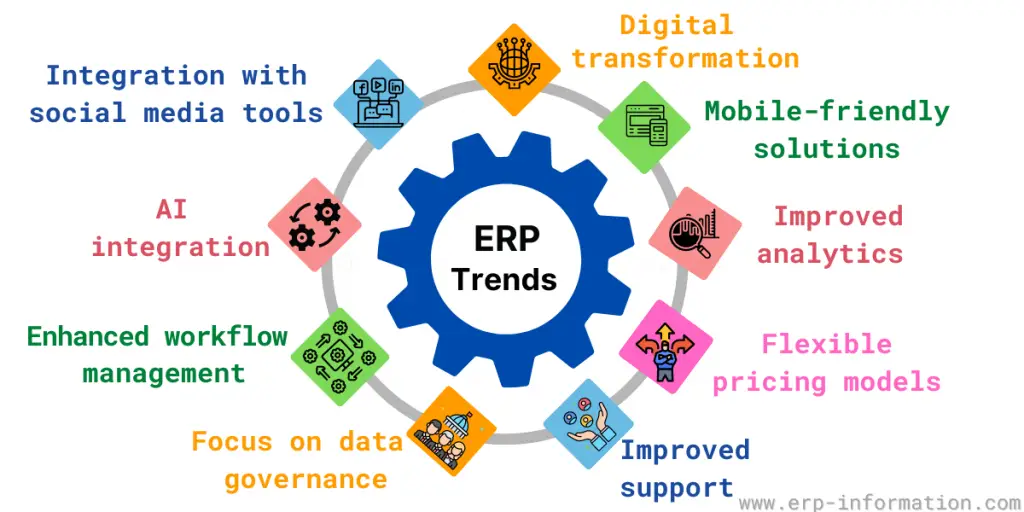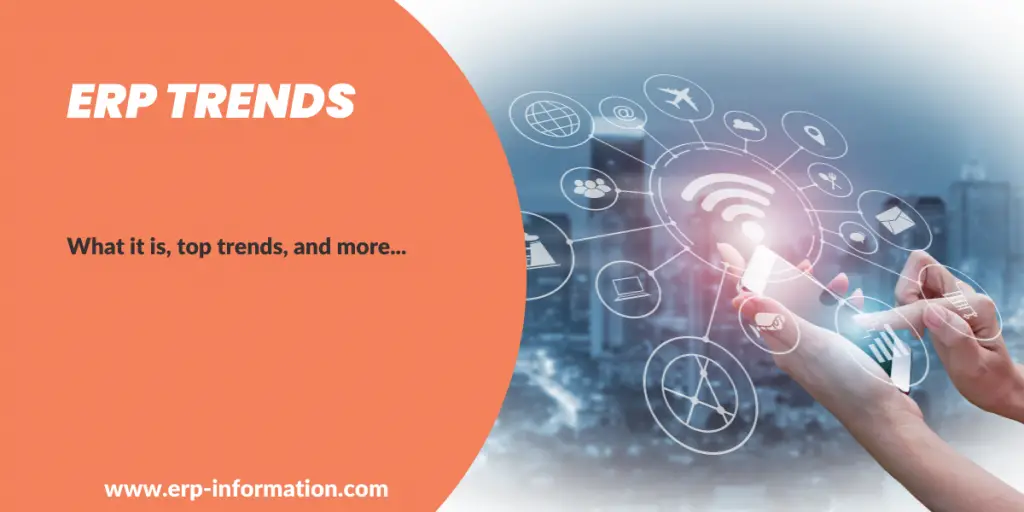ERP is constantly evolving, and it can be hard to keep up with the latest trends.
To stay ahead of the competition, you must ensure your business uses the latest ERP software.
We’ve compiled a list of the 30 top ERP trends for 2026, so you can ensure your business is ahead of the curve.
What Do ERP Trends Mean?
ERP (Enterprise Resource Planning) trends refer to the evolving features, technologies, and practices in the ERP software landscape.
These trends shape how businesses implement and utilize ERP systems to manage and integrate various aspects of their operations, such as finance, procurement, sales, inventory management, and human resources.
Staying up-to-date with these trends can help organizations optimize their ERP investments and ensure they leverage the latest innovations to improve efficiency, reduce costs, and make more informed decisions.
What are the Current ERP Trends in ERP Systems?
The below image shows some of the ERP trends in the current market.

The below list provides the top 30 ERP trends. Some notable ERP trends in the ERP industry include:
1. Flexible deployment options
Enterprise resource planning vendors are offering a greater variety of deployment options to meet the needs of different organizations.
2. Cloud-based ERP
More businesses are adopting cloud-based ERP solutions due to their scalability, flexibility, and lower upfront costs than traditional on-premise systems.
Cloud ERP allows for easier access to data, faster implementation times, and seamless updates.
3. Two-Tier ERP
Initially, businesses deployed a single ERP system for branch offices and headquarters. Later, they came to know it was costly and difficult to implement. Even subsidiaries needed special functionality requirements, and it wasn’t easy to have a one-size-fits-all system.
That’s the reason two-tier ERP trends come into the picture. A 2-tier ERP (Enterprise Resource Planning) strategy is an approach in which an organization implements and manages two separate ERP systems, one at the corporate level (Tier 1) and another at the subsidiary, division, or regional level (Tier 2).
This dual-system architecture allows businesses to address the diverse needs of their various operational units while maintaining centralized control and visibility over the entire organization.
4. Mobile ERP
With the increasing use of smartphones and tablets in the workplace, mobile ERP applications are becoming more prevalent.
These apps allow employees to access real-time data, perform tasks, and make decisions on the go, improving overall productivity and efficiency.
5. Artificial Intelligence (AI) and Machine Learning
AI and machine learning technologies are integrated into ERP systems to enable advanced analytics, automation, and smarter decision-making.
These capabilities help businesses optimize processes, identify trends, and predict future events, leading to better resource allocation and business outcomes.
6. Internet of Things (IoT) Integration
IoT devices collect valuable data from various sources within a company’s operations, such as manufacturing equipment, logistics systems, and inventory tracking.
Integrating IoT data with ERP systems enables businesses to gain real-time insights, monitor performance, and optimize organizational processes.
7. Enhanced User Experience (UX)
Modern ERP systems strongly emphasize user experience, featuring intuitive interfaces, customizable dashboards, and easy-to-use reporting tools. This focus on UX helps increase user adoption, streamline workflows, and improve overall efficiency.
8. Industry-specific ERP Solutions
As businesses seek more tailored solutions to meet their unique needs, ERP vendors increasingly offer industry-specific modules and functionalities.
These specialized systems cater to various sectors’ specific requirements and regulations, such as manufacturing, healthcare, retail, and construction.
9. Increased focus on digital transformation
Enterprises are looking to resource planning systems to provide a foundation for digital transformation initiatives.
Integrating digital technologies into various aspects of a business refers to digital transformation, including how it operates and delivers value to customers.
It is a strategic, ongoing process that involves rethinking and redefining business models, processes, culture, and customer experiences to adapt to the rapidly evolving digital landscape.
Digital transformation goes beyond merely adopting new technologies. The ultimate goal is to improve efficiency, enhance customer experiences, drive growth, and maintain a competitive edge in the market.
10. Integration with other enterprise applications
As enterprises look to get more value from their resource planning systems. Vendors increase integration between these solutions and other enterprise applications.
Some more ERP trends are as follows.
11. Improved analytics and reporting capabilities – Analytics and reporting features are becoming increasingly crucial in resource planning systems. Hence it has become one of the ERP trends.
12. Support for Industry 4.0 initiatives – Many enterprise resource planning solutions are designed with Industry 4.0 in mind.
13. Improved project management capabilities – Project management features are becoming more critical in resource planning systems.
14. More social and collaborative features – Social and collaborative features are being added to many resource planning solutions.
15. Greater emphasis on sustainability – Sustainability is becoming a more important consideration for enterprise resource planning vendors.
16. Enhanced supply chain management capabilities – Supply chain management features are becoming more crucial in resource planning systems and have become one of the ERP Trends.
17. Improved asset management capabilities – Asset management features are becoming more critical in resource planning systems.
18. More flexible pricing models – Enterprise resource planning vendors are offering more flexible pricing models to meet the needs of different organizations.
19. Increased focus on data governance is increasingly important for enterprise resource planning vendors. This is one of the critical ERP trends.
20. Greater support for big data applications – Many enterprise resource planning solutions are now designed to support big data applications.
21. Improved compliance management capabilities -Compliance management features are becoming more important in resource planning systems.
22. Better integration with social media tools – Social media integration is becoming an important feature of many enterprise resource planning solutions.
23. Improved support for Agile methodology – Many organizations are adopting agile methodology, and enterprise resource planning vendors are responding with solutions that better support this approach.
24. Enhanced workflow management capabilities – Workflow management features are becoming more important in resource planning systems.
25. Greater cloud computing support is becoming an increasingly important consideration for enterprise resource planning vendors.
26. More robust security features – Vendors pay greater attention to security as enterprise resource planning systems become more critical to business operations.
27. More significant support for international operations – Many enterprise resource planning solutions now offer better support for global operations.
28. Blockchain technology integration – Several enterprise resource planning vendors are exploring the potential for integrating blockchain technology into their solutions.
29. Enhanced integration with business intelligence tools – Vendors increase integration between these solutions and business intelligence tools as enterprise resource planning systems become more data-driven.
30. Increased use of Personalized ERP solutions: It refers to customized ERP systems tailored to meet an organization’s unique needs, requirements, and preferences.
These solutions address specific business processes, industry standards, and operational challenges, ensuring a better fit and greater effectiveness than generic, off-the-shelf ERP software.
Conclusion
Enterprise resource planning (ERP) is a critical business function, and over the next few years, we can expect to see several significant changes in this area. In this post, we’ve highlighted some of the most important trends impacting ERP in 2026.
These include support for big data applications, improved compliance management capabilities, better integration with social media tools, and enhanced workflow management capabilities.
In addition, as ERP systems become more complex, businesses need to keep up with the latest ERP trends to maintain a competitive edge.
We hope this post helped you to understand the ERP trends.
